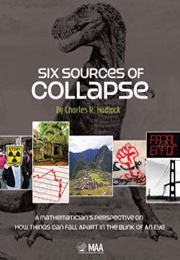 Six Sources of Collapse
Six Sources of Collapse Book contents
- Frontmatter
- Preface
- Acknowledgements
- Contents
- 1 Introduction
- 2 Predicting Unpredictable Events
- 3 Group Behavior: Crowds, Herds, and Video Games
- 4 Evolution and Collapse: Game Playing in a Changing World
- 5 Instability, Oscillation, and Feedback
- 6 Nonlinearity: Invitation to Chaos and Catastrophe
- 7 It's All About Networks
- 8 Putting It All Together: Looking at Collapse Phenomena in “6-D”
- References
- Index
- About the Author
4 - Evolution and Collapse: Game Playing in a Changing World
- Frontmatter
- Preface
- Acknowledgements
- Contents
- 1 Introduction
- 2 Predicting Unpredictable Events
- 3 Group Behavior: Crowds, Herds, and Video Games
- 4 Evolution and Collapse: Game Playing in a Changing World
- 5 Instability, Oscillation, and Feedback
- 6 Nonlinearity: Invitation to Chaos and Catastrophe
- 7 It's All About Networks
- 8 Putting It All Together: Looking at Collapse Phenomena in “6-D”
- References
- Index
- About the Author
Summary
My New Hampshire
The only wildlife I encountered regularly in my Brooklyn youth were pigeons, squirrels, and rats. I quickly learned not to look up when walking close to apartment buildings with fancy cornices where pigeons would roost, and we never knew if we would be greeted by beady eyes and whiskers when opening the dumbwaiter door. Thus you can probably well imagine the interest I brought to a fairly large tract of New Hampshire woodland that my family and I bought many years ago as a summer getaway and, as it turns out, an endless source of projects. Here was rich nature in a new setting ready to be engaged at a different level. But it also came with collapse themes at almost every turn, from broken electric lines to trees falling on the well house, crushed culverts under the access road, and the accumulated effects of over a century of snow and wind loads on a poorly designed building. An academic like myself can turn these experiences into fascinating learning opportunities and intellectual (and physical!) challenges, while at the same time gaining a rock-solid rooting in reality that's a good balance to too much time in university ivory towers. In this chapter I hope to tell you something that you may not already know about evolution and collapse, or at least something that you may not have thought about very much. It derives from this New Hampshire experience. But first a brief review of evolutionary principles.
- Type
- Chapter
- Information
- Six Sources of CollapseA Mathematician's Perspective on How Things Can Fall Apart in the Blink of an Eye, pp. 61 - 84Publisher: Mathematical Association of AmericaPrint publication year: 2012


